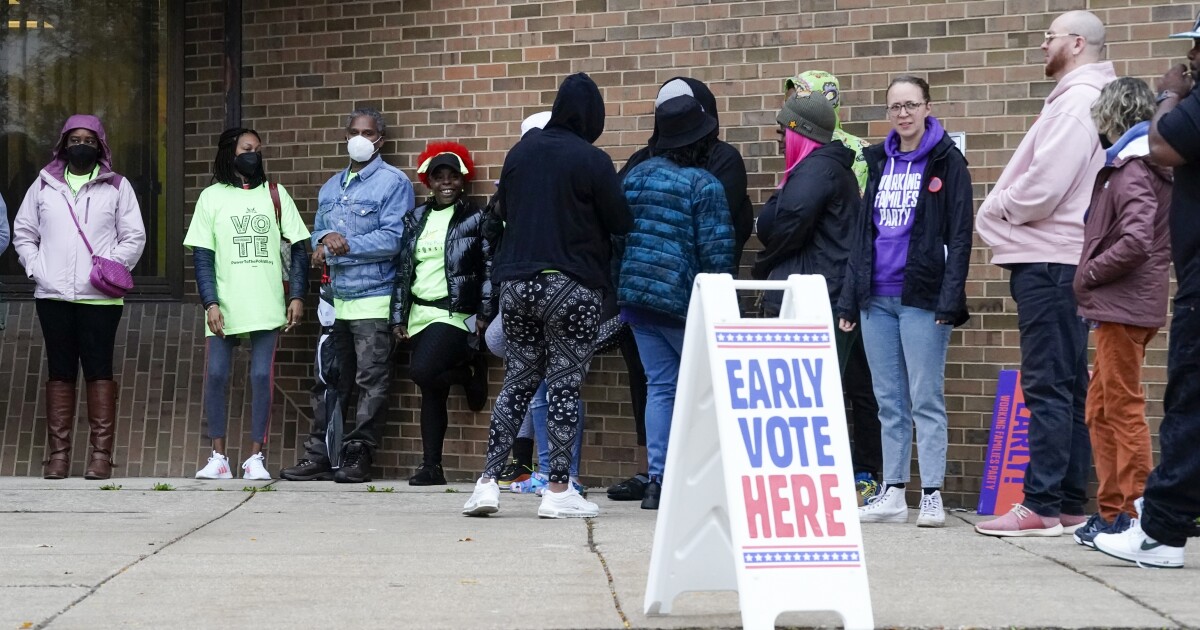

As the 2022 midterm cycle enters its final stretch, there are a number of unanswered questions and lingering variables that could affect how candidates will fare in their respective races.
All 435 seats in the House are up for grabs as well as 35 of the 100 Senate seats, prompting both parties to ramp up efforts as Democrats seek to hold their tight majorities and Republicans vie to flip both chambers in their favor.
MIDTERMS 2022 LIVE: UPDATES FROM THE CAMPAIGN TRAIL AHEAD OF CRUCIAL ELECTION
Lower down the ballot, 36 out of 50 states are set to elect governors, 10 states will choose their attorneys general, and 12 states will pick their secretaries of state — all crucial offices that have control over state laws and how states will administer the 2024 elections.
With only 10 days to go until Election Day, here are 10 questions and issues that remain top of mind for voters and party leaders:
Which party is poised to take control of Congress?
As the midterm elections wind down, many voters are looking for an answer to one question: Who will take control of Congress for the next two years?
Republicans have an 81% chance of winning control of the House, according to election forecaster FiveThirtyEight, giving the GOP the best odds in at least one of the two chambers. The fate of the House has long been expected to fall into GOP hands, with the party never falling within 30 percentage points of Democrats over the last six months.
The Senate, however, is another story. While once predicted to fall into Republican hands, Democrats now have a 55% chance of maintaining control of the Senate, according to FiveThirtyEight. Republicans entered the midterm election cycle poised to win both chambers by large margins, but those odds have shifted regularly as Election Day inched closer. Polling from June showed Republicans with a 60% chance of winning the Senate, falling to just 20% by late October.
How will abortion allegations in Georgia affect the consequential midterm race?
One of the most high-profile midterm races, the Senate contest in Georgia between Sen. Raphael Warnock (D-GA) and Republican Herschel Walker is likely to help determine which party will gain control of the Senate in November.
Walker’s campaign has been rocked in recent weeks with allegations that the former NFL football star had paid for an ex-girlfriend to get an abortion in 2009 while the pair were dating, followed by a second accusation he paid another woman for the abortion procedure in 1993. The allegations threaten to derail his Senate bid as Walker has campaigned as a staunch anti-abortion candidate.
However, several Republican leaders have defended Walker amid the accusations, denouncing them as false political attacks. Polling that was conducted after the allegations emerged showed a slight decline for the Republican, but the race has tightened as Election Day nears — with both candidates sitting at a virtual tie, according to RealClearPolitics.
Will third-party candidates upend Democratic victories in reliably blue states?
While Republicans and Democrats have largely been focused on more prominent nationwide races, a handful of contests that the Left once took for granted could be at risk due to third-party and independent candidates threatening to siphon votes away.
Most notably, the governor’s race in Oregon has been upended by independent candidate and former state Sen. Betsy Johnson who threatened to split the electorate between herself, a onetime Democrat, and liberal Tina Kotek — giving Republican contender Christine Drazan a path to victory. Despite being a solidly blue state, Johnson’s presence in the race has shifted the contest to being deemed a “toss-up” by election forecasters.
A GOP victory in November would mark the first time a Republican won control of Oregon’s governor’s mansion in roughly four decades.
Can Fetterman edge out a win in Pennsylvania after a lackluster debate performance?
Long considered to be the front-runner in the Pennsylvania Senate race, Democratic candidate John Fetterman faces an uphill battle to convince voters to support him over Republican Dr. Mehmet Oz — especially after struggling through the pair’s first and only televised debate on Tuesday.
Moderators allowed the use of closed captioning so Fetterman could read and respond to questions more easily due to an auditory processing disorder caused by a stroke he suffered in mid-May. However, Fetterman still struggled through some of his answers and stumbled over certain phrases — prompting criticism from Republicans and worrying some Democrats about how it would affect his election chances.
An InsiderAdvantage poll taken in the days following the debate shows Oz leading Fetterman: 48% to 45%. Fetterman still holds the lead when considering the average of all polls conducted over the midterm cycle, leading Oz by 1.9 percentage points, according to election forecaster FiveThirtyEight.
Election officials are bracing for possible threats to poll watchers
Election officials and law enforcement agencies are bracing for possible threats to poll watchers and intimidation directed toward voters at polling places on Election Day, prompting officials to implement increased security measures.
The FBI and the Department of Homeland Security both issued warnings earlier this month about threats to election workers, with the former deploying its Threats to Election Workers Task Force to mitigate concerns. Most of the reported threats have come from states that underwent high-profile election disputes in 2020, including Arizona, Colorado, Georgia, Michigan, Pennsylvania, Nevada, and Wisconsin.
For example, Georgia election workers have implemented a text messaging system that poll watchers can use to report threats or suspicious behavior. Additionally, voters in Chicago can expect to see an increased presence of law enforcement officials to work as “election investigators” at polling places.
The economy continues to weigh on voters as core inflation continues to rise
Core inflation ticked up once again in September, according to the gauge favored by the Federal Reserve — spelling trouble for Democrats who have been the targets of frequent GOP attacks using rising inflation rates as an indictment of Democratic leadership.
The recent report harms Democratic chances of maintaining their majorities in Congress, as a majority of voters say they’re likely to vote Republican because of economic concerns and rising inflation rates. About 44% of voters say those are the most important issues facing the country, according to a recent New York Times–Siena College poll.
Of those who are most concerned with the economy, a majority of voters favor Republicans (64%) over Democrats (30%) to handle the issue.
Will Democrats be able to hold on in New Hampshire and Arizona Senate races?
Democrats currently hold a slight advantage in the 50-50 Senate, benefiting from Vice President Kamala Harris who serves as a tiebreaking vote. Although party control of the Senate has been deemed a toss-up in the midterm elections, there are a handful of Democratic incumbents facing tough challenges as they seek to defend their majority in the upper chamber.
Sen. Maggie Hassan (D) faces a tight race against retired Army Brig. Gen. Don Bolduc (R) in New Hampshire in what is considered to be one of the most vulnerable races this midterm cycle. The race has tightened in recent weeks, with the latest poll from InsiderAdvantage showing Hassan with a narrow 1-percentage-point lead as of Sunday.
Meanwhile, in Arizona Sen. Mark Kelly (D) and Republican challenger Blake Masters are tied 47% to 47%, raising the stakes in one of the most consequential elections this midterm cycle. Another 3% of voters say they plan to back libertarian candidate Marc Victor and 4% remain undecided.
Election deniers are poised to win a handful of races: How will this affect 2024?
A majority of voters will have a candidate running for statewide office who has rejected the results of the 2020 election, raising concerns that so-called “election deniers” may be elevated to positions that administer and certify elections nationwide.
More than 40 election-denier candidates across 27 states have advanced to the November ballot in the midterm elections, according to a tracker from States United Democracy Center. Broken down, these candidates will be on the ballot for half (50%) of the governor’s races across the country and more than one-third of races for secretary of state (44%) and attorney general (33%).
The prominence of election-denier candidates has prompted concerns among election integrity groups such as SUDC, as those positions will have a heavy influence on how the 2024 elections are administered in their respective states.
Many states are expecting record voter turnout, even surpassing 2018 numbers
More than one million Georgia voters have participated in early voting as of Wednesday, shattering previous midterm records, according to the secretary of state’s office. By the time polls close on Nov. 8, voter turnout is expected to blow away the previous midterm election in 2018 when about 3.9 million Georgians voted early.
Elsewhere, more than 17 million people have already voted as of Friday in roughly 40 states that have opened early voting options, according to data analyzed by the University of Florida’s U.S. Elections Project. Of those, more than 10.9 million people voted through mail-in ballots, while about 6.2 million cast their votes in person.
The big numbers nationwide mark a higher-than-normal turnout for early voting during a midterm election cycle and put the country on par with the record turnout recorded in 2018.
Roe v. Wade: Will Democrat bets pay off?
For much of the midterm election cycle, Democrats shifted their focus to abortion rights in the wake of the Supreme Court’s decision to overturn Roe v. Wade — hoping to use the issue to motivate voter turnout in their favor.
CLICK HERE TO READ MORE FROM THE WASHINGTON EXAMINER
Polling that was conducted before the Supreme Court’s decision was announced in June indicated that about 37% of voters would be more motivated to vote if Roe was overturned, according to a Kaiser Family Foundation survey. That sentiment was largely split along party lines, with 55% of Democrats saying it would motivate them to vote compared to just 73% of Republicans who said it would not make a difference for them.
Fast forward to October, and that motivation has largely stayed the same — about 40% of voters say their state’s abortion laws have increased the likelihood they’ll cast their ballots in November, according to the Kaiser Family Foundation. For those who live in states with strict abortion laws, that number increases to 50%.







